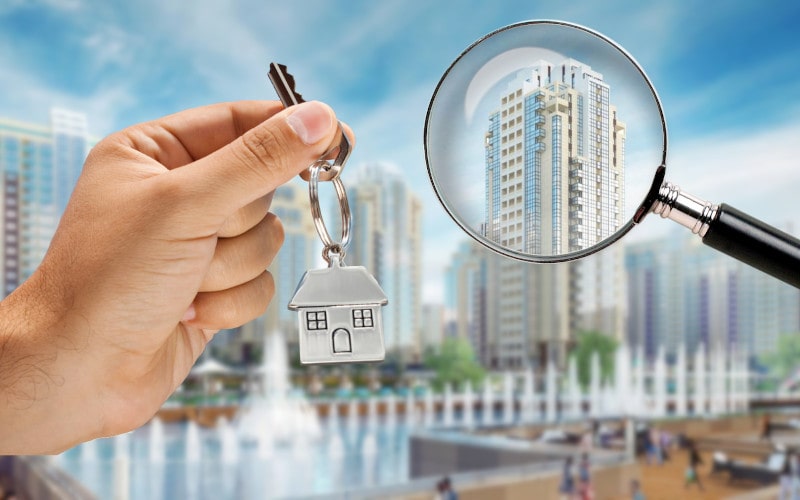How to find out who owns the apartment? Where can I see what real estate a person has? How to check if the apartment is not under arrest or mortgage? I often hear such questions from clients.
First of all, such information is necessary for those who independently check an apartment in a new building, as well as for those who buy real estate on the secondary market.
Many people think that only notaries or lawyers can get such information, and it is closed to other people. However, in 2015, the authorities opened real estate registers and now anyone can find out the owner of the apartment and any other information about real estate. The only thing that cannot be verified is the information about the previous owners, since only notaries have access to such data.
In order to receive a certificate on real estate, you need to register in the Cabinet of electronic services. You can also log into your account using an electronic digital signature or BankID (for example, via a Privatbank card).
After we choose “Register”, we go to the “Registration of a new user” section, where we choose a natural person and a regular registration. Do not forget to check that you agree to the registration rules.

In order to get a certificate on real estate, you need to register on the Online House of Justice website. For this you will need an electronic digital signature (EDS). It can be obtained from accredited key certification centers (CSC). PrivatBank clients can get EDS online in 5 minutes (instructions at the link).
- To login, select your CSK from the pop-up list, then click the “Select” button, find your EDS file on your computer, enter the key protection password, and click the “Read” button.
- On the left, select “Services”, then click on “Information from the State Register of Property Rights”.
- You will find yourself on the page Obtaining information from the State Register of Real Property Rights. In this section, you need to select the criteria by which you will search for information on real estate. This can be the address of the apartment, the registration number of the real estate object, the cadastral number of the land plot, or the data of an individual or legal entity.
- In order to find real estate by address, you need to know the exact address of the apartment or house. Click Next.
- Then enter the data about the location of the real estate.
- Next, click “Submit an application” and, if the real estate data is in the register, you will receive “Request” in the “Response” column.
- Click “Pay” and you will be redirected to the payment page. After paying the cost, which is UAH 20, you will receive an information certificate, which will contain information about the owner of the property, arrests and mortgages.
If you have problems with obtaining a certificate, you can always write to us and lawyers will help you figure out how to get a certificate free of charge. You can also order a professional inspection of secondary real estate or an inspection of an apartment in a new building from our real estate lawyers in order to buy an apartment safely without unnecessary risks.
Basic rules for renting real estate for business
The lease agreement for commercial premises is usually concluded for a long period. The constant change of premises is not beneficial to either side. The tenant adjusts the place for his needs, and the landlord needs the premises to be permanently leased.
Before entering into this “long-term relationship”, a potential tenant needs to check the “background” of the leased premises and make sure that the object of the lease really belongs to the owner, he does not have litigation, mortgages or arrests.
It will be very disappointing if you are left without a lease due to the seizure of property or the “enslaving” terms of the lease. Use our tips to avoid rental trouble.
Documents confirming ownership
Most likely, the leased object has already been registered in the State Register of Real Estate Rights and the owner will provide you with a certificate from this register. However, it may not be relevant. You can get a new certificate yourself. See step by step instructions here.
The certificate will contain information about the registered ownership of the leased object, the presence or absence of a mortgage, arrests, lease of this object (an entry is made in the register if the lease period exceeds 3 years) and the like.
For a more thorough check of the leased object, you should obtain an extended certificate from a notary. It will contain information about the documents on the basis of which the leased object was registered, as well as the history of changes in owners and encumbrances.
In practice, we had a case when a 2016 construction lease object was put into operation in a simplified manner as such, which was built before 1992.
Ownership of such an object may be revoked, resulting in, at a minimum, the termination of the provision of public services.
In the event that the ownership of the leased object was formalized before the functioning of the real estate registries, the owner of the leased object must provide you with documents that testified to the ownership at that time and a certificate from the BTI on the presence of a registered ownership of the real estate object.
Litigation
Perhaps he was once involved in various fraudulent schemes or engaged in other illegal activities. The presence of such disputes may lead you to refuse to rent a property due to distrust of its owner.
Some negative court decisions on a leased property may lead to the revocation of ownership of it.
Also, by a court decision, the leased object may become the property of another person. In this case, the lease with you will remain in effect, unless otherwise provided by the terms of the lease. However, this does not mean that the new owner will not create obstacles for you in owning the rented premises.

Lease contract
The lease agreement for commercial real estate is concluded in writing. If the term of the contract exceeds 3 years, it is subject to notarization and state registration.
Pay attention to the object, which is specified in the lease agreement. Information about it must match the information from the technical passport and a certificate from the state register of rights to real estate.
The lease agreement may provide for the preparation of the premises for use for the intended purpose. The parties agree among themselves on the list, procedure and timing of the repair work. The rent for this period, by agreement of the parties, is reduced or not charged at all.
The fact of the transfer of the premises to the tenant is certified by the act of acceptance and transfer of the services rendered. It indicates the state of the object at the time of transfer to the tenant. After the termination of the lease, you will need to return the premises in the condition that was recorded in the act of acceptance and transfer of the object. Therefore, if the object has flaws or a worn condition, you definitely need to indicate this in the act.
Agree with the landlord the possibility of increasing the rent and the maximum amount of such an increase. For example, “The rent for the premises cannot increase by more than 5% in two years.”
As a general rule, the current repair of the leased premises and all its systems is carried out by the tenant, and major repairs are carried out by the lessor. However, the parties to the contract may distribute these obligations differently.
You should pay attention to the clauses of the agreement on liability for accidents that may occur in the rented premises. It would be fair to point out that the tenant should be liable only for those accidents that occurred through his fault. It is also advisable to provide for the obligation of the lessor to be responsible for accidents in public networks.
The lease agreement may provide for the possibility of unilateral termination of the agreement at the initiative of the lessor without any significant grounds. This provision is not binding on the lease agreement and may shorten the stipulated lease term for the premises. We recommend insisting on its exclusion in the absence of significant grounds for unilateral termination of the contract.
In the lease agreement, by agreement of the parties, penalties may be determined: a fine and a penalty. It is important that they are mutual, established for significant violations of the contract and encourage the other party to comply with it.
In addition to general penalties, the lease agreement usually establishes the right of the landlord to unilaterally prevent the tenant from accessing the rented premises, stop the supply of utilities, and the like. Such rights of the lessor should be established only for material breaches of the contract.
Inspection of commercial real estate is a prerequisite for its lease. During the inspection, you may find circumstances that in the future may negatively affect you or convince you not to rent the premises at all. And only you can choose: take the risk or refuse to rent this object.
Find the risky terms of the lease agreement, individualize them in your favor. Pay attention to the key aspects that we have described in this article.
With this minimum set of commercial property and lease verification tools, you can protect yourself from hidden risks.
